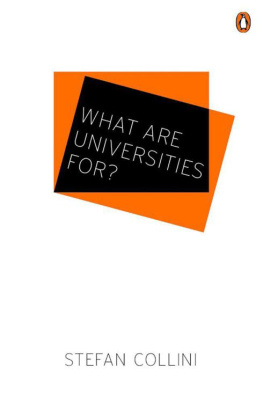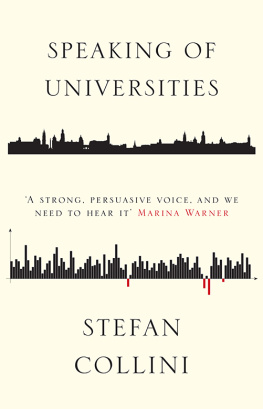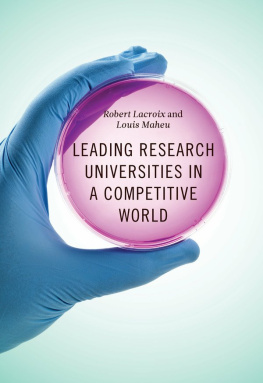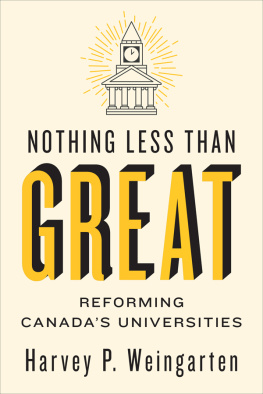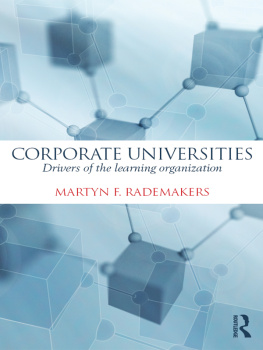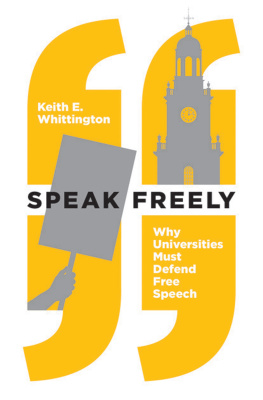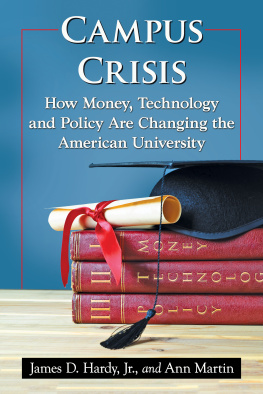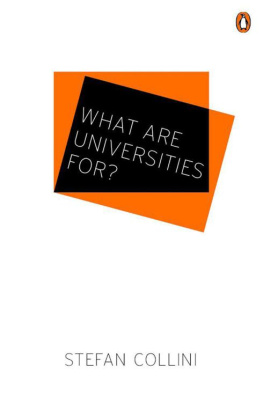
STEFAN COLLINI
What Are Universities For?

PENGUIN BOOKS
Contents
PENGUIN BOOKS
WHAT ARE UNIVERSITIES FOR?
Stefan Collini has become one of the most respected voices in public debates about universities and their place in modern society. He is Professor of Intellectual History and English Literature at Cambridge University and Fellow of the British Academy; he is also a frequent contributor to the Guardian, the London Review of Books, The Times Literary Supplement and the Nation. Reviewers of his recent Common Reading: Critics, Historians, Publics (2008) described him as one of Britains finest essaysists and writers. Other works include Absent Minds: Intellectuals in Britain (2006), English Pasts: Essays in History and Culture (1999), Matthew Arnold: A Critical Portrait (1994) and Public Moralists (1991).
To my colleagues and students,
who have taught me what universities are for
Introduction
Asking what something is for all too often turns out to be asking for trouble. There is, to begin with, the danger of seeming to reduce a complex activity or institution to a single, narrow purpose: it is doubtful whether an answer that is both short and illuminating could be given to questions about what, say, love is for or a country is for we immediately sense that any answer is bound to be a tiresome mixture of banality and tendentiousness. And then there is the problem that any answer may seem to invite the same question Yes, but what is that for? spiralling down into an endless regress. As the ball of reasoning starts to roll down the slope of justification, we realize that our likely destination is a muddy pond of abstract nouns in which all distinctiveness gets lost. But any intermediate stopping-point is bound to seem arbitrary and, for that reason, vulnerable to somebody giving the ball another nudge. This situation recalls that old cartoon which depicted a truculent and precocious small child, head in hands on the kitchen table, saying to an exasperated parent standing nearby: I was merely observing that Because is why seemed to me to contain a hidden premise. History does not record whether the child went on to become a distinguished philosopher (or, indeed, survived into adulthood at all).
But, sometimes, asking what something is for can, if understood as an expository tactic, a starting-point rather than a ruling, be a means of helping us to clear away the discursive debris that accumulates round any widely used category. The very asking of the question in this slightly over-insistent, finger-jabbing form may be enough to encourage reflection to cut through the incidental clutter and begin to wonder what kind of response could count as a useful answer. From then on, it is probably sensible not to try to press the question further in this narrow form, but to let rumination extend itself, brooding on the diversity that may shelter under a single term, pondering a series of characterizations or historical instances rather than seeking a single defining proposition. That, certainly, will be the tactic of this book. But the initial question will already have done its work if it helps to launch such a train of reflection, thereby giving us some distance from the numbingly familiar repetition of a few stock phrases in news stories and comment columns. John Maynard Keynes famously asked What is economics for?, using that question to remind his readers that the pursuit of wealth was not an end in itself but a means to . Keyness example is pertinent, and inspiring, because any discussion of the place of universities in contemporary society will inevitably be driven to articulate, in however rudimentary terms, some sense of human purposes beyond that of accumulating wealth.
Or so one might think. Yet it is scarcely an exaggeration to say that the greater part of public discourse about universities at present reduces to the following dispiriting proposition: universities need to justify getting more money and the way to do this is by showing that they help to make more money. This book is an attempt to start from somewhere else and to talk about universities in a different way.
Since there is an obvious risk that my arguments in this vein will be misinterpreted and misrepresented in some quarters (I still bear some bruises from earlier attempts to make this case), let me say emphatically here that I and, I believe, pretty much everyone else who works in or cares about universities do not for a moment underestimate the expense of these institutions or presume that there is some God-given right for them to be lavishly funded. Of course the case for their value and importance needs to be made. But it needs to be made in appropriate terms, and these terms are not chiefly, and certainly not exclusively, economic. They are intellectual, educational, scientific, and cultural. In addition, it has to be emphasized that higher education is a public good, not simply a set of private benefits for those who happen to participate in it, and therefore that it is a mistake to allow the case for universities to be represented as a merely sectional or self-interested cause on the part of current students and academics.
This book argues that we shall not identify the distinctive character of universities if we concentrate on the ramifications of one or another local, and necessarily temporary, model of funding them. Similarly, we shall not come very close to understanding the true character and interest of intellectual enquiry if we start from the presuppositions of those who believe that such enquiry is a luxury whose economic benefit remains to be demonstrated. And nor will we arrive at an adequate grasp of what is, or should be, involved in a university education, as opposed to various other forms of instruction and training, if we start from the current preoccupation with access. Funding, impact, access: these three starting-points taken either singly or, more often, as a trinity signalling the realism and up-to-dateness of ones position now utterly dominate the political and media discussion of universities in Britain. But these are secondary matters, and the last two, in particular, are merely transient formulae clumsy articulations of aspects of social attitudes to which politicians find it expedient to appeal. When I take issue with these fashions, as I do in , my focus is on the assumptions underlying them, not (except incidentally) on recommending some alternative set of arrangements.
In to bear on current debates in a pointed and topical way. These chapters also bear witness, in a necessarily episodic form, to the sharply accelerating way in which successive governments, of whichever party, have attempted to impose an increasingly economistic agenda on universities over the past two decades.
Since what I have to say about universities is partly a reflection on practice, I should indicate at the outset the kind of practice of which I have most direct experience. In the broadest terms, my own writing and teaching have been in the overlapping fields of literature and history. More particularly, my work has been concerned with aspects of the literary and intellectual culture of (largely) Britain in the nineteenth and twentieth (and now twenty-first) centuries, including the history of its universities. What I have to say would no doubt be different if my own background were in, say, philosophy or music or classics or art history, and perhaps more different still if it were in one of the social or natural sciences. I should also acknowledge that the experience on which I am drawing has been gained from working in comparatively favourable circumstances within highly regarded and (for the most part) well-supported universities, first at the University of Sussex from the mid-1970s to the mid-1980s, and subsequently at the University of Cambridge. I recognize that anyone who works in such institutions needs to be regularly reminded that the activities of teaching and scholarship may have to be pursued in much more constraining circumstances elsewhere.
Next page
